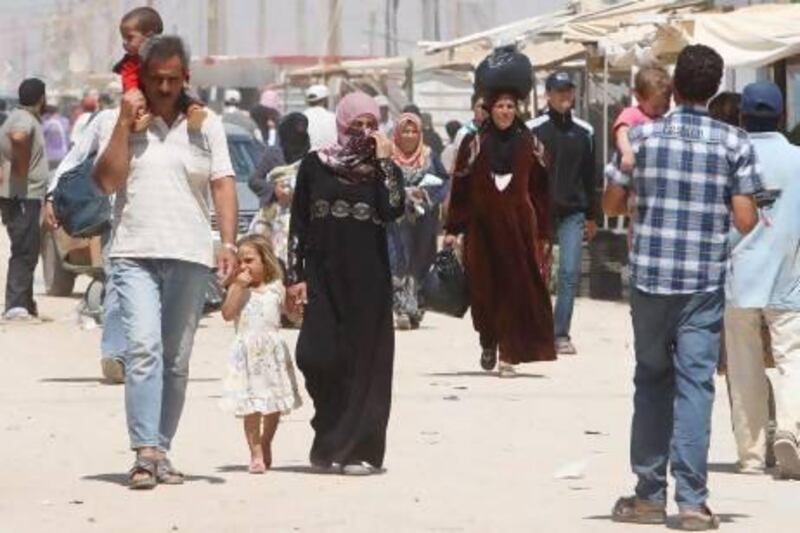GENEVA // Syria's refugee crisis is one of the biggest tragedies of our times, the United Nations said yesterday, with more than two million Syrians, half of them children, fleeing their country and about 4.2 million displaced internally.
The flow of refugees has gathered momentum in recent weeks amid fears of western military action against the regime over its alleged use of chemical weapons against civilians.
The UN secretary general, Ban Ki-moon, said yesterday that a confirmed case of chemical weapons use would be "a serious violation of international law and an outrageous war crime" but he questioned the legality of the US president Barack Obama's military plans, saying that the use of force in Syria would only be legal with UN Security Council authorisation.
While Mr Obama seeks congressional support for a strike on Syria, the UN also revealed the growing human toll of the Syrian civil war.
"There are no words to express this tragedy," said Antonio Guterres, the United Nations high commissioner for refugees (UNHCR) in Geneva yesterday, adding that the amount of refugees fleeing shows no sign of abating and risked destabilising the region.
"Two million people, many have lost their houses, members of their families, their possessions," he said.
The Obama administration said last week that it has evidence that the Assad regime used chemical weapons near Damascus on August 21 in attacks that killed more than 1,400 people. Mr Al Assad's forces were also accused of using poison gas in Khan Al Assal in March and a Syrian forensic expert who claims to have proof of that attack defected to Turkey, the Syrian opposition said yesterday. The Syrian National Coalition said Abdeltawwab Shahrour, head of the forensic medicine committee in Aleppo, would make public his evidence of the March 19 chemical attack. But Mr Shahrour failed to appear at a news conference planned by the opposition.
The UN's investigation continues into the chemical attacks near Damascus and Mr Ban warned yesterday that strikes against Syria could worsen the crisis.
Nonetheless, Mr Obama won the backing yesterday of two top Republicans as he prepares to make his case for military action in Congress next week. John Boehner, the Republican speaker of the US House of Representatives, and the House majority leader, Eric Cantor, pledged their support for military action after meeting the US president.
"What we are envisioning is something limited. It is something proportional. It will degrade Assad's capabilities," Mr Obama said. "At the same time we have a broader strategy that will allow us to upgrade the capabilities of the opposition."
As opposition fighters fight to wrest control of the country from Mr Al Assad, about 5,000 Syrians flee their country every day, the UN refugee agency said. Mr Guterres said the majority of the refugees go to Lebanon and other neighbouring countries where concern is mounting of a spillover of the Syria conflict. He said the Syria refugee crisis is without parallel worldwide.
"At this particular moment it's the highest number of displaced people anywhere in the world," he said.
"Syria has become the great tragedy of this century, a disgraceful humanitarian calamity with suffering and displacement unparalleled in recent history."
He said while the first one million refugees were registered over a period of two years, the second million had fled in the past six months. Along with about 4.2 million internally displaced people, they represent about a third of Syria's pre-war population of 20.8 million.
Mr Guterres said the crisis was having a "terrible impact in the societies and the countries that are hosting all of these refugees".
By yesterday, more than 720,000 Syrian refugees were registered or in the process of being registered in Lebanon, a country of about 4.5 million people, Mr Guterres said. "For a country like Lebanon, this is indeed an existential question," he said.
An additional 515,000 refugees are in Jordan, 460,000 in Turkey, 168,000 in Iraq and 110,000 in Egypt, according to UN figures.
The influx is taking an enormous toll on the infrastructure, services and economies in these countries, and causing a spillover of the conflict, with pockets of violence erupting, Mr Guterres said. "The risks of an explosion in the Middle East is growing by the day," he warned.
The countries in the region are bearing the brunt of the cost of the refugee crisis, while the international community has provided less than half of the US$1.1 billion (Dh4.4bn) the UNHCR initially said it needed to help Syrian refugees this year.
Turkey has spent more than $1.5 billion on direct assistance to refugees — only 10 per cent of which had been covered by international funds, Mr Guterres said.
He is set to meet in Geneva ministers from Iraq, Jordan, Lebanon and Turkey today in a bid to accelerate international support.
The US is by far the biggest donor of aid for the Syrian crisis, having already contributed about $230 million, according to the UNHCR.
Russia has contributed about $10 million and China $1 million.
* Agence France-Presse and Reuters





